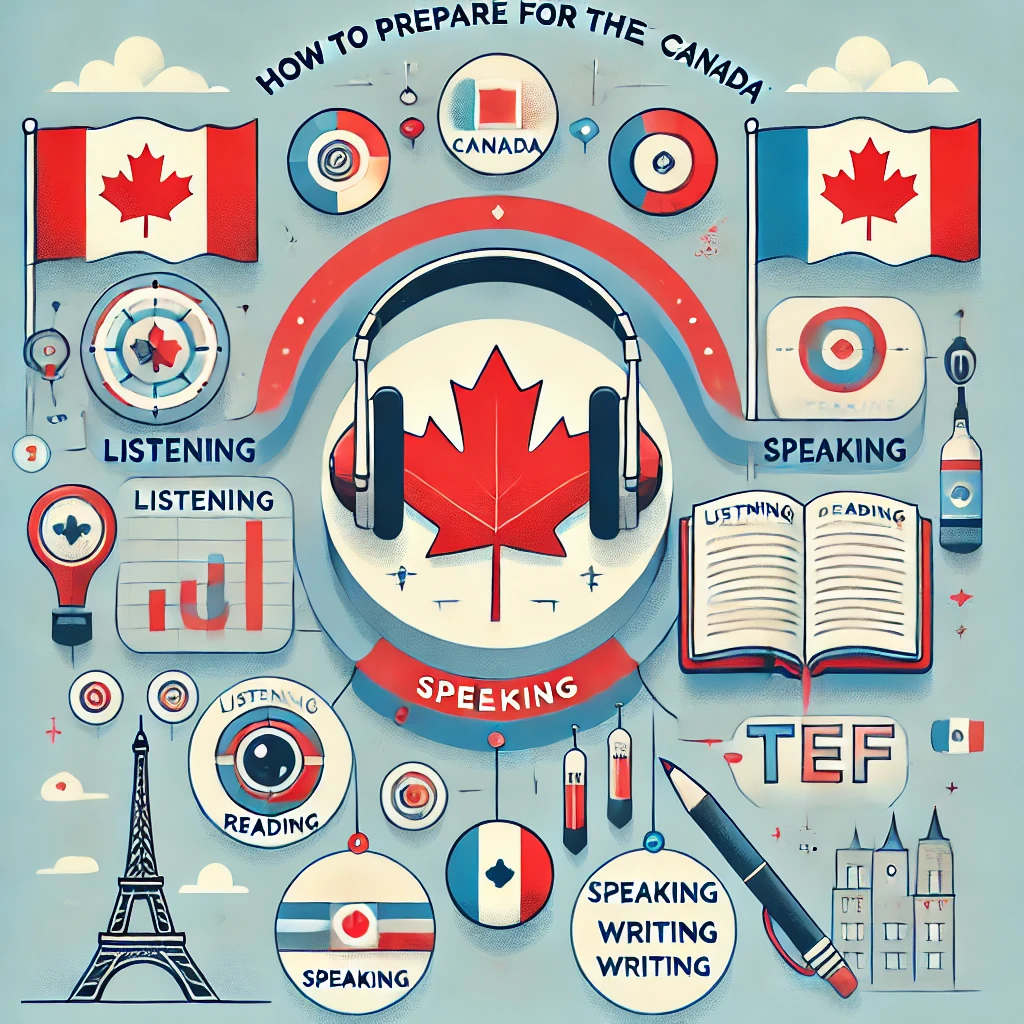If you’re planning to immigrate to Canada, the Test d’Évaluation de Français (TEF) Canada is likely a crucial step in your journey. Recognized by Immigration, Refugees and Citizenship Canada (IRCC), this test evaluates your proficiency in French and contributes to your Comprehensive Ranking System (CRS) score under the Express Entry system. Whether you’re aiming for permanent residency, citizenship, or work purposes, excelling in TEF Canada can significantly boost your prospects. This guide provides an in-depth look at how to prepare effectively for the TEF Canada.
Understanding the TEF Canada Exam Structure
The TEF Canada assesses your French language skills in four key areas:
- Listening (Compréhension Orale)
- Reading (Compréhension Écrite)
- Speaking (Expression Orale)
- Writing (Expression Écrite)
Each module is scored individually, and your performance in all modules contributes to your overall score. Depending on the immigration program, you may need to take only specific modules, but completing all four is highly recommended for maximizing CRS points.
Here’s a breakdown of the test format:
- Listening: 40 questions, 40 minutes
- Reading: 50 questions, 60 minutes
- Speaking: Two tasks, 15 minutes
- Writing: Two tasks, 60 minutes
Step-by-Step Preparation for TEF Canada
1. Assess Your Current French Level
Before diving into preparation, evaluate your current proficiency. Tools like the Common European Framework of Reference for Languages (CEFR) can help. Aim for a B2 or C1 level for competitive scores, as these levels align with higher CRS points.
2. Familiarize Yourself with the Test Format
Understanding the test structure is crucial. Obtain sample papers or past question sets to get a feel of the questions. Time yourself while practicing to simulate actual test conditions.
3. Strengthen Core French Skills
Listening (Compréhension Orale):
- Watch French movies, news, or podcasts. Channels like TV5Monde and France 24 are excellent resources.
- Practice with TEF-specific audio exercises available online or in preparation books.
Reading (Compréhension Écrite):
- Read French newspapers, blogs, and books to expand your vocabulary.
- Focus on different text types, such as advertisements, articles, and opinion pieces.
- Practice skimming and scanning techniques for efficient reading.
Speaking (Expression Orale):
- Practice speaking on various topics, such as personal experiences or current events.
- Work with a language partner or tutor for real-time feedback.
- Record yourself to analyze pronunciation, grammar, and fluency.
Writing (Expression Écrite):
- Practice writing essays and letters on common TEF topics.
- Learn the appropriate formats for formal and informal letters.
- Focus on sentence structure, connectors, and coherence.
4. Enroll in a TEF Preparation Course
Professional coaching can significantly enhance your preparation. Many language institutes offer TEF-specific courses that include mock tests, feedback, and targeted practice. Online platforms like Learn French with Sonal can also provide tailored resources for the TEF Canada exam.
5. Use TEF Preparation Books and Online Resources
Invest in high-quality preparation materials, such as:
- Éditions Didier’s TEF preparatory books
- Online platforms like PrepMyFuture and FrancaisAuthentique
- Mobile apps for vocabulary building, such as Duolingo and Memrise
6. Develop a Study Schedule
Consistency is key. Create a study plan that balances all four sections, dedicating more time to your weaker areas. Aim for daily practice, with at least 2–3 hours of focused study.
Tips for Test Day
- Arrive Early: Ensure you have adequate time to settle and avoid last-minute stress.
- Bring Necessary Documents: Check the TEF Canada website for the required ID and materials.
- Stay Calm: Manage time effectively and tackle easier questions first to build confidence.
- Listen and Read Carefully: Pay close attention to instructions and avoid rushing through tasks.
Common Challenges and How to Overcome Them
Challenge: Limited Vocabulary
- Solution: Create flashcards of commonly used French words and phrases.
Challenge: Anxiety During Speaking
- Solution: Practice mock interviews with a tutor to build confidence.
Challenge: Time Management
- Solution: Take timed mock tests to improve speed and accuracy.
Leveraging TEF Canada Results for Immigration
Your TEF Canada score directly affects your CRS points. A high proficiency level (CLB 7 or above) can add substantial points to your Express Entry profile. Additionally, French-speaking candidates may benefit from bonus points if they demonstrate English proficiency as well.
Final Thoughts
Preparing for the TEF Canada is a challenging but rewarding endeavor. With a structured plan, consistent practice, and the right resources, you can achieve a high score and enhance your chances of immigrating to Canada. Remember, persistence and dedication are key. Bonne chance!


